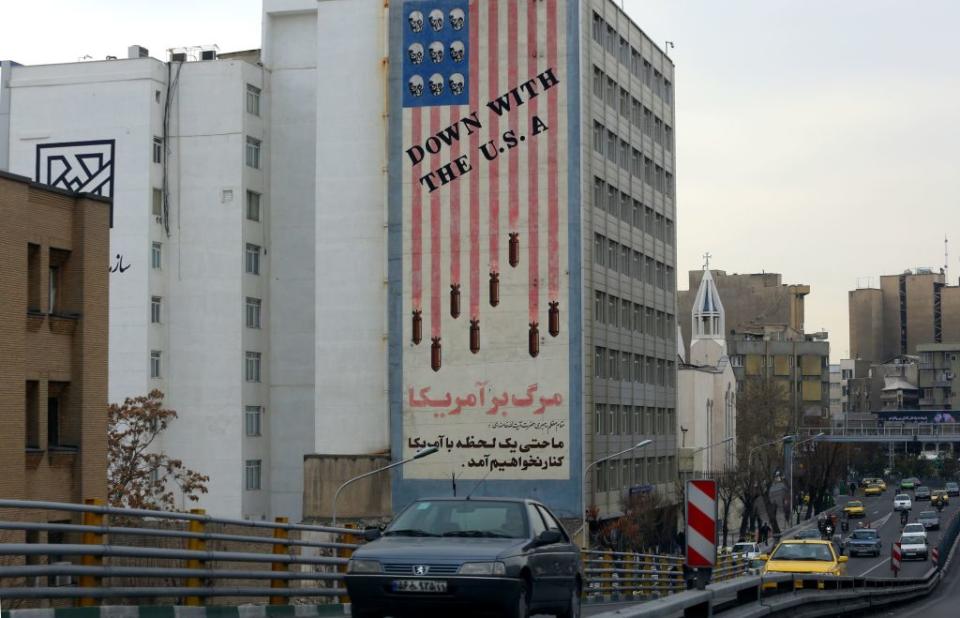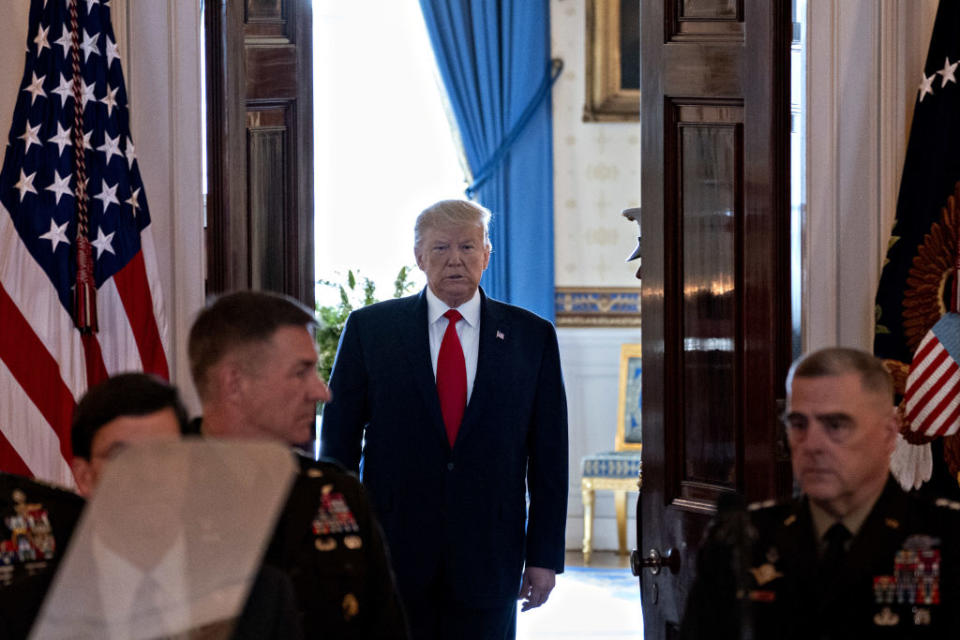'A good thing for the world': Trump addresses Iran in 'slurry' speech
As he strode up to the podium to address the world, flanked by America’s top military brass, US President Donald Trump opened his much anticipated response to the Iran conflict with a bold declaration.
“As long as I am president of the United States, Iran will never be allowed to have a nuclear weapon,” he said.
The rest of the speech, which the US President gave on Thursday morning (AEST) at the White House, seemed intent on de-escalating the crisis which had spiralled perilously close to war after he authorised the targeted killing last week of Iran’s top general, Qassem Soleimani.
Iran responded on Wednesday with its most direct assault on America since the 1979 seizure of the US Embassy in Tehran, firing more than a dozen missiles at two military bases in Iraq.
'God help us': Shock assassination puts the US on 'precipice of war'
Iran launches rockets at US troops on Iraqi bases in 'revenge operation'
'Blood and treasure': How a war between Iran and the US could unfold
Iran and US step back from the brink of war
The two nations appeared to have stepped back from the brink of possible war this morning as Trump signalled he would not retaliate militarily for Iran’s missile strikes on Iraqi bases housing US troops.
In the end, no one was harmed in the strikes, but US and allied forces in the region, including Australia, remained on high alert.
“Iran appears to be standing down,” Trump said. “Which is a good thing for all parties concerned and a very good thing for the world.”
In his nine-minute, televised address, Trump spoke of a robust US military with missiles that are “big, powerful, accurate, lethal and fast.” But then he added: “We do not want to use it.”
On social media, many noted the heavy breathing, sniffing and slight slurring of the president during the address, so much so that the term ‘slurring’ began trending on Twitter in the US.
So I just watched Trump's speech, and—no kidding—is he okay? He didn't just seem winded and slurry, but on at least two occasions he seemed startled that he was unable to say a word. He blinked fast and talked around the prepared phrasing rather than trying again.
— Ted Genoways (@TedGenoways) January 8, 2020
Despite all the posturing and online taunts, Iran has signalled it is not interested in a wider clash with the US. In the wake of yesterday’s missile attacks, Iran’s Foreign Minister Mohammad Javad Zarif tweeted that the country had “concluded proportionate measures in self-defence.”
Trump, facing perhaps the biggest test of his presidency, credited the minimal damage to an early warning system “that worked very well” and said Americans should be “extremely grateful and happy” with the outcome.
However there remains no obvious path to diplomatic engagement, as Trump pledged to add to his “maximum pressure” campaign of economic sanctions. He said the new, unspecified sanctions would remain in place “until Iran changes its behaviour”.
“For far too long, all the way back to 1979 to be exact, nations have tolerated Iran’s destructive and destabilising behaviour in the Middle East and beyond. Those days are over,” Trump said Thursday.
“Their pursuit of nuclear weapons threatens the civilised world.”

Despite the president’s assurances, international observers aren’t so sure Iran’s potential pursuit of nuclear weapons can be curtailed.
John Blaxland, a professor of International Security and Intelligence Studies at the ANU, says the world must brace for Iran’s pursuit of nuclear weapons.
“There’s some compelling national security imperatives in Iran to proceed down that path,” he told Yahoo News Australia this week. “I think it’s only reasonable that we assume that’s where they’re heading and they’re not far off.”
White House ‘has no plan B’
During the 2016 election, Trump campaigned on a promise to extract the United States from “endless wars” and is facing a major challenge as he faces re-election in November.
On Wednesday, he said the United States was “ready to embrace peace with all who seek it.” That marked a sharp change in tone from his warning a day earlier that “if Iran does anything that they shouldn’t be doing, they’re going to be suffering the consequences, and very strongly.”
Members of Congress were briefed on the Iran situation overnight in closed-door sessions on Capitol Hill, the Associated Press reported. Many Democrats expressed dissatisfaction with the administration’s justifications for the drone strike on Soleimani.
Virginia congressman Gerry Connolly said he “left the room more troubled than when he went in.”
I just left the administration's briefing on the strike that killed Qasem Soleimani. They tried, unsuccessfully, to conjure up a rationale for the president's reckless decision.
It was sophomoric and utterly unconvincing. I left the room more troubled than when I went in.— Gerry Connolly (@GerryConnolly) January 8, 2020

Democrat Jim Himes of Connecticut said he asked Secretary of State Mike Pompeo if the administration had a Plan B in case tensions with Iran continued to escalate.
“He had no answer about Plan B,” Himes told AP.
Trump spoke of new sanctions on Iran, but it was not immediately clear what those would be. The primary agencies involved in implementing such penalties – the US departments of Commerce, State and Treasury – do not preview those actions to prevent evasion.
Since withdrawing from the 2015 nuclear deal, the administration had already imposed harsh sanctions on nearly every significant portion of Iran’s economic, energy, shipping and military sectors.
With AP
Do you have a story tip? Email: newsroomau@yahoonews.com.
You can also follow us on Facebook, Instagram and Twitter and download the Yahoo News app from the App Store or Google Play.




